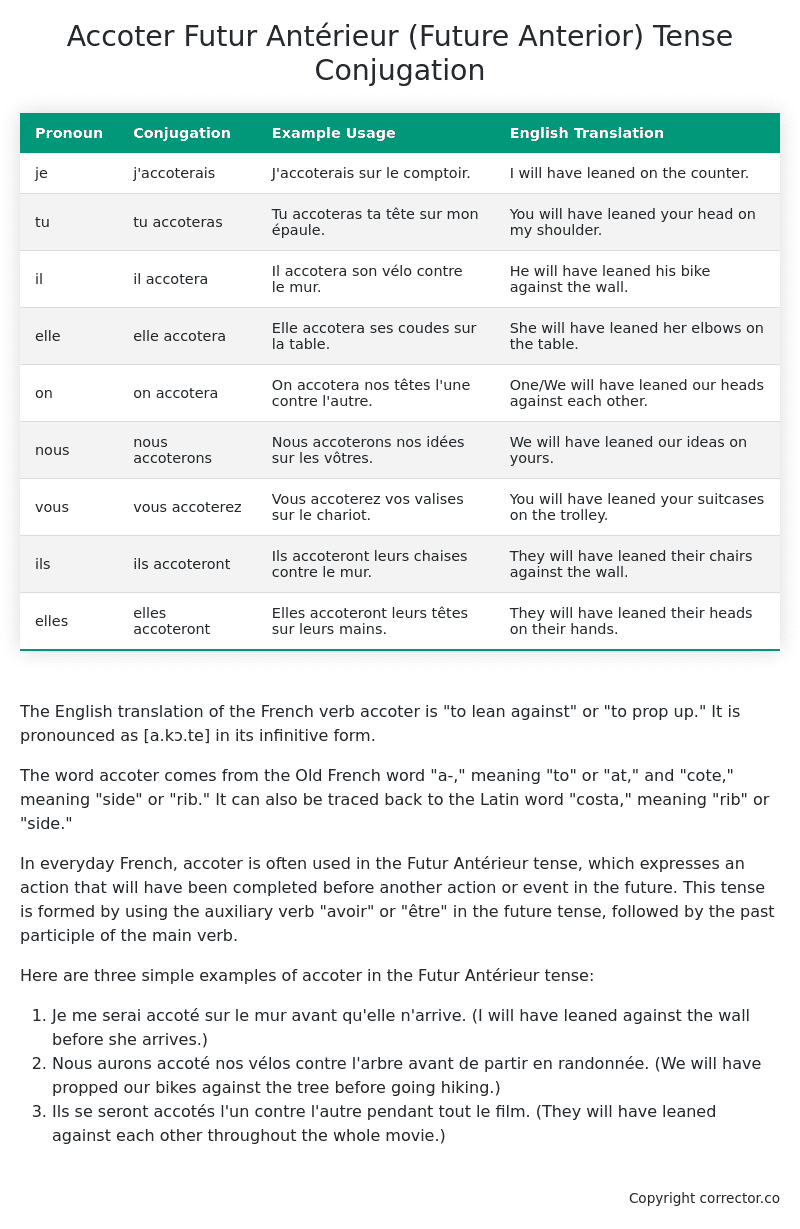Futur Antérieur (Future Anterior) Tense Conjugation of the French Verb accoter
Introduction to the verb accoter
The English translation of the French verb accoter is “to lean against” or “to prop up.” It is pronounced as [a.kɔ.te] in its infinitive form.
The word accoter comes from the Old French word “a-,” meaning “to” or “at,” and “cote,” meaning “side” or “rib.” It can also be traced back to the Latin word “costa,” meaning “rib” or “side.”
In everyday French, accoter is often used in the Futur Antérieur tense, which expresses an action that will have been completed before another action or event in the future. This tense is formed by using the auxiliary verb “avoir” or “être” in the future tense, followed by the past participle of the main verb.
Here are three simple examples of accoter in the Futur Antérieur tense:
- Je me serai accoté sur le mur avant qu’elle n’arrive. (I will have leaned against the wall before she arrives.)
- Nous aurons accoté nos vélos contre l’arbre avant de partir en randonnée. (We will have propped our bikes against the tree before going hiking.)
- Ils se seront accotés l’un contre l’autre pendant tout le film. (They will have leaned against each other throughout the whole movie.)
Table of the Futur Antérieur (Future Anterior) Tense Conjugation of accoter
| Pronoun | Conjugation | Example Usage | English Translation |
|---|---|---|---|
| je | j’accoterais | J’accoterais sur le comptoir. | I will have leaned on the counter. |
| tu | tu accoteras | Tu accoteras ta tête sur mon épaule. | You will have leaned your head on my shoulder. |
| il | il accotera | Il accotera son vélo contre le mur. | He will have leaned his bike against the wall. |
| elle | elle accotera | Elle accotera ses coudes sur la table. | She will have leaned her elbows on the table. |
| on | on accotera | On accotera nos têtes l’une contre l’autre. | One/We will have leaned our heads against each other. |
| nous | nous accoterons | Nous accoterons nos idées sur les vôtres. | We will have leaned our ideas on yours. |
| vous | vous accoterez | Vous accoterez vos valises sur le chariot. | You will have leaned your suitcases on the trolley. |
| ils | ils accoteront | Ils accoteront leurs chaises contre le mur. | They will have leaned their chairs against the wall. |
| elles | elles accoteront | Elles accoteront leurs têtes sur leurs mains. | They will have leaned their heads on their hands. |
Other Conjugations for Accoter.
Le Present (Present Tense) Conjugation of the French Verb accoter
Imparfait (Imperfect) Tense Conjugation of the French Verb accoter
Passé Simple (Simple Past) Tense Conjugation of the French Verb accoter
Passé Composé (Present Perfect) Tense Conjugation of the French Verb accoter
Futur Simple (Simple Future) Tense Conjugation of the French Verb accoter
Futur Proche (Near Future) Tense Conjugation of the French Verb accoter
Plus-que-parfait (Pluperfect) Tense Conjugation of the French Verb accoter
Passé Antérieur (Past Anterior) Tense Conjugation of the French Verb accoter
Futur Antérieur (Future Anterior) Tense Conjugation of the French Verb accoter (this article)
Subjonctif Présent (Subjunctive Present) Tense Conjugation of the French Verb accoter
Subjonctif Passé (Subjunctive Past) Tense Conjugation of the French Verb accoter
Subjonctif Imparfait (Subjunctive Imperfect) Tense Conjugation of the French Verb accoter
Subjonctif Plus-que-parfait (Subjunctive Pluperfect) Tense Conjugation of the French Verb accoter
Conditionnel Présent (Conditional Present) Tense Conjugation of the French Verb accoter
Conditionnel Passé (Conditional Past) Tense Conjugation of the French Verb accoter
L’impératif Présent (Imperative Present) Tense Conjugation of the French Verb accoter
L’infinitif Présent (Infinitive Present) Tense Conjugation of the French Verb accoter
Struggling with French verbs or the language in general? Why not use our free French Grammar Checker – no registration required!
Get a FREE Download Study Sheet of this Conjugation 🔥
Simply right click the image below, click “save image” and get your free reference for the accoter Futur Antérieur tense conjugation!

Accoter – About the French Futur Antérieur (Future Anterior) Tense
Construction
Common Everyday Usage Patterns
Interactions with Other Tenses
For example
Summary
I hope you enjoyed this article on the verb accoter. Still in a learning mood? Check out another TOTALLY random French verb conjugation!


